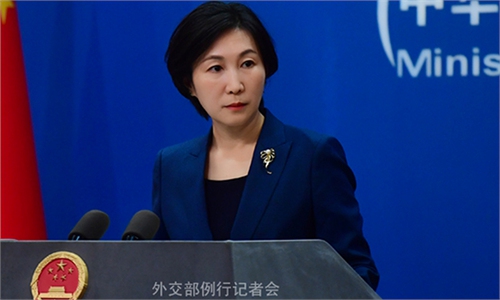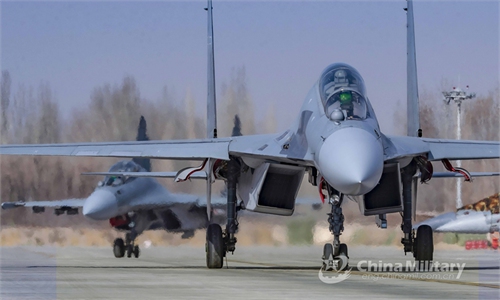
Illustration: Chen Xia/GT
The 20th IISS Shangri-La Dialogue is set to take place in Singapore from Friday to Sunday. The current schedule includes a speech by Chinese State Councilor and Defense Minister Li Shangfu on "China's new security initiative," and a speech by US Defense Secretary Lloyd Austin on "the US' leadership in the Indo-Pacific."
From the theme alone, it's apparent that Austin's speech will focus on how to strengthen the US' dominant position in Asia-Pacific security affairs. In recent years, the Shangri-La Dialogue has gradually become a platform for the US defense secretary to expound on the US' regional security strategy. Although the specifics vary from year to year, the basic routine is the same and can be summarized as "trilogy."
First, pointing the finger at some countries, emphasizing "security threats," and even claiming that the threats are imminent. Second, taking the US as the center and dividing regional countries into three categories based on their proximity to the US: "allies" in the inner circle, "partner countries" in the middle circle, and "other countries" in the outer circle, with a focus on attracting allies. Third, emphasizing the US' military measures, including strengthening military deployments, investing in military resources, enhancing joint exercises with allies, and ensuring allies' confidence in the US military.
In recent years, some signs of insecurity in the Asia-Pacific region have caused concern, with a lack of strategic trust, the resurgence of Cold War thinking, increased tension in relations between major powers, and intensified camp confrontation. The impeded momentum of regional peaceful development is closely related to the emphasis on military alliances, protectionism, and pursuit of zero-sum games by individual major countries.
The Indo-Pacific Economic Framework is essentially a disguised protectionism that promotes internal circulation within small groups, undermines the existing regional cooperation framework, hinders free trade, and reverses regional integration. Although the US claims that its policy aims for regional peace and stability, what people see is the opposite, as its policy harms regional peace and stability. The US also claims that its policy serves the interests of regional countries, but what people see is that it pursues its own interests, including overseas military bases and activities, and "leadership in the Indo-Pacific region." Ultimately, the US prioritizes its hegemonic interests over promoting peace and development that benefit the Asia-Pacific region as a whole.
In contrast, China's foreign policy emphasizes "peace," "development," and a "big family." From building a human community with a shared future to the Global Security Initiative, Global Development Initiative, and Global Civilization Initiative, China's emphasis is highly consistent: openness and inclusiveness, peaceful development, cooperation, and win-win outcomes. China's pursuit is clear: to develop a new security path through dialogue rather than confrontation, through partnership rather than alliance, and through win-win rather than zero-sum games in response to the common aspirations of countries for peace, development, and cooperation.
Additionally, China's initiatives have been successfully implemented in practice. The country has been dedicated to finding solutions to hotspot issues with Chinese characteristics, emphasizing the importance of promoting peace and dialogue. This year, China played a crucial role in mediating a historic reconciliation between Saudi Arabia and Iran, setting a positive example for other regional countries to follow in resolving conflicts through peaceful means. Furthermore, China has released a position paper titled "China's Position on the Political Settlement of the Ukraine Crisis;" President Xi Jinping visited Russia and spoke with Ukraine's President Volodymyr Zelenskyy on the phone; and Chinese envoys have actively worked to promote a resolution to the crisis. China has also been actively involved in mediation diplomacy, taking proactive steps to promote political solutions to hotspot issues in Iran, the Korean Peninsula, Syria, and Palestine. The upcoming speech by the Chinese defense minister at the Shangri-La Dialogue will focus on "China's new security initiative," and people are eagerly anticipating what this new initiative will entail and what makes it unique.
Comparing the approaches of China and the US toward Asia-Pacific security in terms of philosophy, policy, and actions, it is evident that the US is a force for confrontation and division, while China is a force for peace and cooperation. The competition between the US and China is not just a game of two forces, but also a contest between two visions for the Asia-Pacific region. The two world wars and the Cold War have demonstrated that conflict brings about great devastation, disaster, and suffering. Today, with human civilization highly developed, we should not repeat these tragedies. The prospect of win-win cooperation is eagerly awaited, but it will not come automatically and requires persistent efforts. At present, Asia-Pacific security has reached a crossroads: either to maintain regional peace that benefits all countries and sustain the momentum of prosperity and development, or to encourage confrontation and repeat the mistakes of the Cold War and hot war. It is believed that the regional countries will make the right choice based on their own judgment.
The author is a research fellow at China's Academy of Military Sciences. opinion@globaltimes.com.cn



